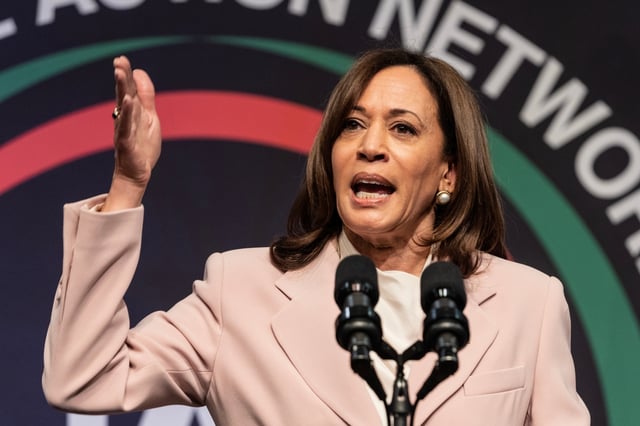Harris Presidential Campaign Takes Aim at High Food Prices
If elected president this November, Vice President Kamala Harris plans to propose a first-of-its-kind ban on “price gouging” in the food and grocery industry.
In a statement, Harris’s campaign said her proposal would include “clear rules of the road to make clear that big corporations can’t unfairly exploit consumers to run up excessive corporate profits on food and groceries.” Harris also plans to more closely scrutinize mergers and acquisitions between large food producers and grocers, “specifically for the risk that the proposed merger would raise grocery prices for consumers.”
[RELATED: Government 'Strike Force' Makes Play for Large Grocers]
The move is part of a broader economic policy that also includes provisions for fair housing prices.
FMI – The Food Industry Association released a statement from its President Leslie G. Sarasin following the policy proposal, in which Sarasin stresses that inflation, not price gouging, has caused price increases among consumer goods. She also shared that conversations about food prices should “remain grounded in reality and data, rather than rhetoric.”
"It is both inaccurate and irresponsible to conflate an illegal activity like price gouging – a defined legal term in which specific violations of trade practices law occur − with inflation, which is a broad, macroeconomic measure of increases in consumer prices over time due to supply chain cost pressures,” Sarasin said. “In the context of food, inflation impacts how far the dollar goes when buying groceries.”
Continued Sarasin: “Americans should feel confident that the food industry has zero tolerance for deceptive practices like price gouging, an illegal activity that has no place in our stores and is inconsistent with the way the food industry conducts its business of feeding American families.”
National Grocers Association (NGA) CEO and President Greg Ferrara, meanwhile, believes Harris's proposal calling for a ban on grocery price gouging is a solution in search of a problem, and hopes that the new administration will "look closely at anticompetitive behaviors, including price discrimination, that are increasing prices for independent grocers and the community members they serve."
"We firmly believe that rather than proposing new legislation far-off in the future, the Government should be enforcing the Robinson-Patman Act, a key antitrust law that already exists, but has been ignored for decades as big chains unfairly wield their influence," Ferrara said in a statement. "If Washington is serious about helping lower prices for consumers, it can help in three important ways: lower skyrocketing swipe fees, rein in excessive and burdensome regulations, and enforce antitrust laws like the Robinson-Patman Act that enhance price competition amongst retailers, regardless of size or location.”
While it is a hot-button topic this election season, inflation is showing signs of slowing. The latest Consumer Price Index (CPI) data from the U.S. Bureau of Labor Statistics (BLS) shows that overall inflation rose just 0.2% in July following June’s first decline since May 2020. The year-over-year rate, meanwhile, came in at 2.9%, the lowest rate since March 2021.
Politicians have been keeping a keen eye on grocery prices over the past year, most recently when U.S. Senators Elizabeth Warren (D-Mass.) and Robert P. Casey, Jr. (D-Pa.) sent a letter to Kroger Chairman and CEO Rodney McMullen questioning the retailer’s use of electronic shelf labels.
Warren and Casey expressed concerns about what they deemed dynamic pricing from Kroger and other American grocers. “Widespread adoption of digital price tags appears poised to enable large grocery stores to squeeze consumers to increase profits,” they wrote. The politicians also sounded a cautionary note about “sensitive consumer data,” through the use of cameras on ESLs displays.
Kroger first launched ESLs in 2018 and has expanded usage to more U.S. locations in the ensuing years.
However, Kroger maintains that its pricing methods are ultimately shopper-centric and can benefit the overall market in a number of ways. “Kroger’s business model is to lower prices over time so that more customers shop with us, which leads to more revenue that we then invest in lower prices, higher wages, and an even better shopping experience. Everything we do is designed to support this strategy, and customers are shopping more with Kroger now than ever because we are fighting inflation and providing great value,” a spokesperson told Progressive Grocer in an email. “Any test of electronic shelf tags is to lower prices more for customers where it matters most. To suggest otherwise is not true.”











